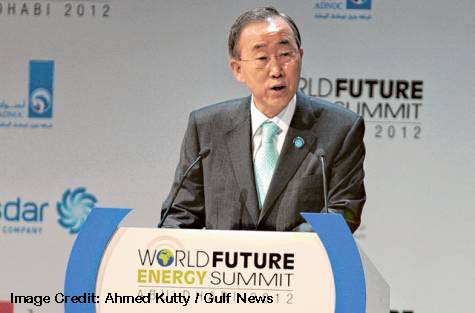ID :
223541
Tue, 01/17/2012 - 11:37
Auther :
Shortlink :
https://www.oananews.org//node/223541
The shortlink copeid
Ban advocates clean energy to aid disconnected masses

Abu Dhabi, Jan 17, 2012 (WAM) - Over a billion people lack access to electric power and three billion people depend on coal, wood and waste material for their heating and cooking needs, UN Secretary-General Ban Ki-moon told delegates at the fifth World Future Energy Summit 2012 (WFES) which is taking place in Abu Dhabi under the patronage of General Sheikh Mohammad Bin Zayed Al Nahyan, Crown Prince of Abu Dhabi and Deputy Supreme Commander of the UAE Armed Forces according to a report in "Gulf News."
"The WFES, which is held under the theme ‘Powering Sustainable Innovation', is the perfect platform to examine the implications for the large-scale adoption of renewable energy and clean technologies in the world," said Ban, calling on "world leaders to spearhead initiatives to help increase investments in the field of renewable energy and its technology transfer".
Ban added that the mounting pressure to realise emissions reductions will help inspire greater adoption of sustainable energy across the world.
"Renewable energy is essential for our societies. It is a key to bring about global economic growth in addition to protecting the global environment for the generations to come," he said.
The UN chief called on world leaders and heads of state to act in order to save the world and collaborate with the private sector to innovate clean energy projects that help change the lives of people. There is a dire need for a clean energy revolution. There should be a high level of cooperation and partnerships, encouraging public and private spending for intellectual capital, Ban said stressing that investment in green economies can provide an opportunity for growth and prosperity in developed and developing countries.
"We need innovation to meet the increasing world demand on energy through partnerships between the public and private sectors on one hand and civic societies on the other because this will help create economic opportunities, protect the environment and improve the living conditions of the people," he said.
Emissions targets
"Sustainable development needs sustainable energy. Therefore, there is a dire need to decrease the gas emissions by 2050 by 50 per cent in the world," Ban said.
Sultan Al Jaber, CEO of Masdar, said that Abu Dhabi is leading by example with its objective of producing 7 per cent of its electricity from renewable sources by 2020.
"Energy solutions cannot be driven by individual countries and must rely on collaboration, and encourage fostering competition between different energy industries," said Al Jaber.
Chinese Premier Wen Jiabao highlighted renewable energy initiatives in his country. "In China, we embrace innovation, sustainable redevelopment and renewable energy as core drivers for our economic growth and for the better living conditions for our people," he said.
He added: "China has emerged as a renewable energy power worldwide, and there are cities in China which depend on renewable energy."
Nasser Abdul Aziz Al Nasser, president of the United Nations General Assembly, said that 2012 is going to be the year of renewable energy.
"The importance of developing resources and taking initiatives aimed to help us use new technology to proceed further with our economic growth," Al Nasser said.
Efficiency challenge
He reiterated that there is a call by the UN to provide sustainable energy to the world by 2030 by enhancing power efficiency.
South Korea's Prime Minister Kim Hwang-sik said: "Renewable energy has been a topmost priority on the South Korea agenda, as a country that has prided itself throughout the years for great innovations, it only made perfect sense for Korea to be strongly represented in a summit that focuses on powering innovation."
Kim said that South Korea aims to generate 11 per cent of its energy from renewables by 2030, pointing out that 2 per cent of its GDP has been allocated to renewable energy development.
"This is compared with a current figure of 2.46 per cent achievement of these targets," said Kim, adding that Korea has earmarked US$891.2 million (Dh3.27 billion) for renewable energy projects and financing for solar and wind power energy facilities.
Export potential
He pointed out that Korea "aims to strengthen its new and renewable energy sectors amidst expectations that such sectors would export US$40 billion in 2015 compared with US$4.6 billion in 2009.
Bertrand Piccard, CEO of Solar Impuse, said that besides raising awareness of the increasing cost competitiveness of solar power applications, "world leaders should promote sustainable energy in order to save the environment which has been badly affected by gas emissions".
"The panel discussions and exhibition will highlight all the key issues relating to the integration of solar into the energy mix," Naji Al Haddad, Exhibitions director of WFES 2012, said.
A total of 25 key renewable energy projects, with a combined value of US$4 billion, are participating in the Project Village.
Middle Eastern projects on show at the dedicated Project Village at WFES 2012 include a 200-megawatt wind farm under development on the Gulf of Suez; a 160-megawatt solar power plant in Morocco; and the US$400 million Shams Ma'an photovoltaic power plant underway in Jordan, exhibition sources said. – Gulf News





